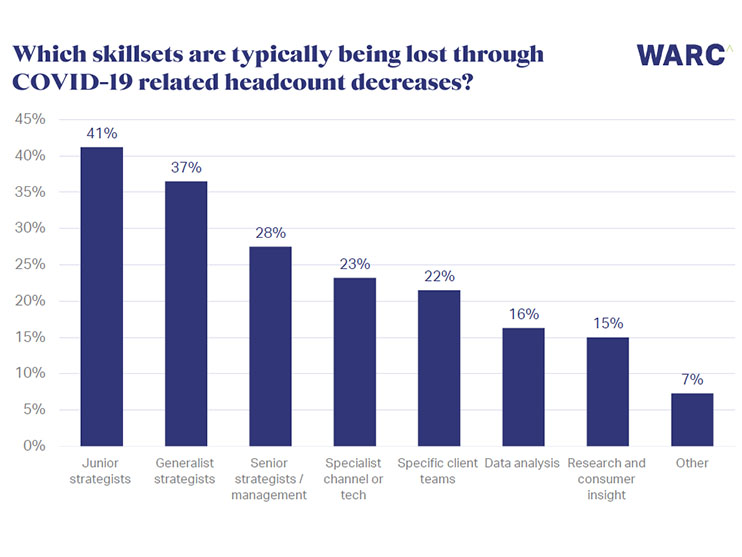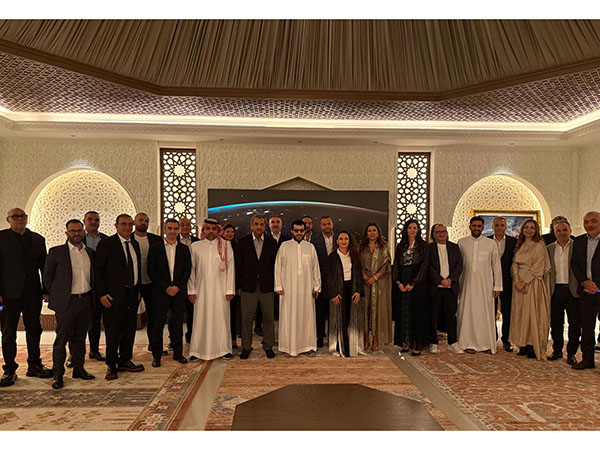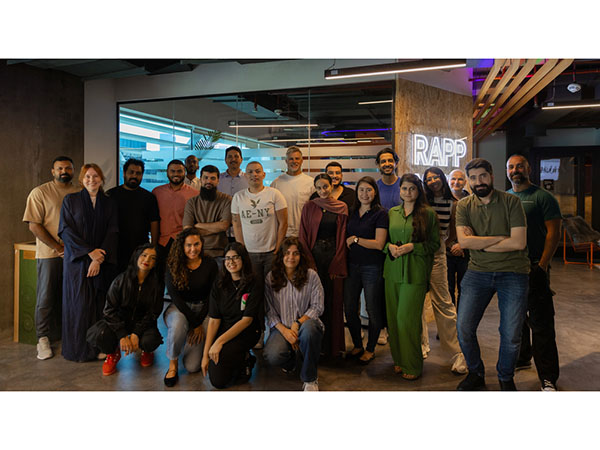News - News In Brief
Global survey of senior strategists reveals the challenges and opportunities brought on by the COVID-19 crisis
July 23, 2020

26% of respondents surveyed have seen headcounts decreased, and a further 18% were expecting them down the line. This is just one of the findings included in The Future of Strategy 2020 report, released today by WARC, the global authority on advertising and media effectiveness, following its annual worldwide survey of more than 1,200 senior strategists.
Fielded in May and June 2020, this year's report focuses on the impact that the COVID-19 pandemic has had on strategy, across headcounts, budgets, and the role of strategy during the crisis.
With 69% of respondents agreeing that COVID-19 will fundamentally change the way agencies work, this fourth edition of the report, also addresses what long term changes might result, in a year that has caused significant disruption to the industry.
WARC's Future of Strategy 2020 key findings are:
• COVID-19 drives an increasing appreciation of strategy
Brands have had to lean on their strategists more than ever before as the pandemic has forced them to rapidly pivot away from planned marketing strategies.
This enforced agility has resulted in a renewed appreciation of the role strategy plays for some brands, as they have looked to their agencies and consultants for the reassurance and sound advice they have needed to navigate their way through the crisis. Many strategists see now as the time to build on this momentum, capturing the opportunity to lead their clients in different directions while they are open to new ideas.
Brent Nelson, Chief Strategy Officer, Publicis Group North America, comments: "The challenges and emergent questions facing brands are complex and well beyond fundamental communications strategy.The pressing need to account for greater and greater uncertainty has made one thing blindingly clear: the value and need for senior, experienced and diversely skilled planning and account talent."
Strategists have been integral to brands' response to COVID-19: 54% were very involved in their clients' COVID-19 plans and only 1% had no involvement.
Yet, at a time when strategists are reporting high levels of influence, cuts to strategy teams have been common, and further cuts are anticipated.
• Headcounts decrease despite the value of strategy increasing
There has been a significant impact of COVID-19 on headcounts in strategy teams, despite strategists telling us that they are in more demand and feel more valued than ever. The impact has been acutely felt at junior levels - reminiscent of the 2008/09 crash.
As enterprises adapt to COVID-19's challenges, the resources that previously were allocated to enhancing diversity and inclusion may come under pressure as every item of capital expenditure is subjected to heightened scrutiny.
Kanika Bali, Strategist, Ogilvy Hong Kong, says: "Diversity means including people across the ethnic, cultural, physical ability, gender and sexuality spectrum. Diverse teams will push to break stereotypes by pushing success stories, being champions for non-traditional casting and to call out group thinking in the advertising process."
Ally Owen, Founder, Brixton Finishing School, UK, adds: "Until we start to see all groups represented, we cannot have balance, and without that balance, can we truly claim to understand all the audiences that our clients need to reach?"
Junior strategists are most at risk of COVID-related headcount cuts. 41% said junior strategists were being made redundant or furloughed. This could result in a lack of new and diverse talent entering the industry.
• Budget cuts have a knock-on effect
COVID-19 has reduced the media spend of the majority of brands, which have responded by cancelling or shifting planned work. This has meant a change in role for some strategists, who have had to pivot their focus to advising clients on how to respond and recover.
For other strategists, particularly freelancers, the pandemic has caused a dramatic reduction in work.
Amelia Torode, Co-founder, The Fawnbrake Collective, comments: "The impact that this panic is having on strategists is profound, deeply short sighted and is being felt acutely by freelance strategists. But this will change. Great strategists are sense-makers and meaning-makers and in this confused and confusing new reality, the two things that businesses are most in need of are good sense and meaning."
87% of strategists said their clients have reduced budgets due to COVID-19.
• Short-termism and a shift in purpose
There has been a huge shift to short-termism as a result of budget cuts and a need to drive sales quickly as recession bites. Strategists feel this is a real threat to their role and the value they are able to provide.
At the same time, both at a business level and at a brand level, clients have needed advice on what their brand can and cannot credibly say and do - particularly regarding their 'purpose' - at times of crisis. Many strategists feel now is an opportunity to change purposeful marketing for the better.
Jean-Claude M. Kikonge, Director, Strategy Lead, Cossette, says: "As an industry, how we talk about "purpose" needs to be recalibrated away from its current generic cause-related meaning, to what it has - and should've - always been: actual "reasons to be"."
COVID-19 is exacerbating the trend towards short-termism. 72% of respondents said their clients are focusing more on short-term strategies as a result of the crisis.
Summing up, Amy Rodgers, Managing Editor, Research & Rankings, WARC, says: "WARC's Future of Strategy 2020 report reveals that strategists have been crucial to the pandemic response and have had a chance to shine.
"However, staff and budget cuts are a threat to the discipline. Additionally, the shift to short-termism brought on by the crisis to stimulate quick sales is leaving strategists feeling that their role and value are under threat."














